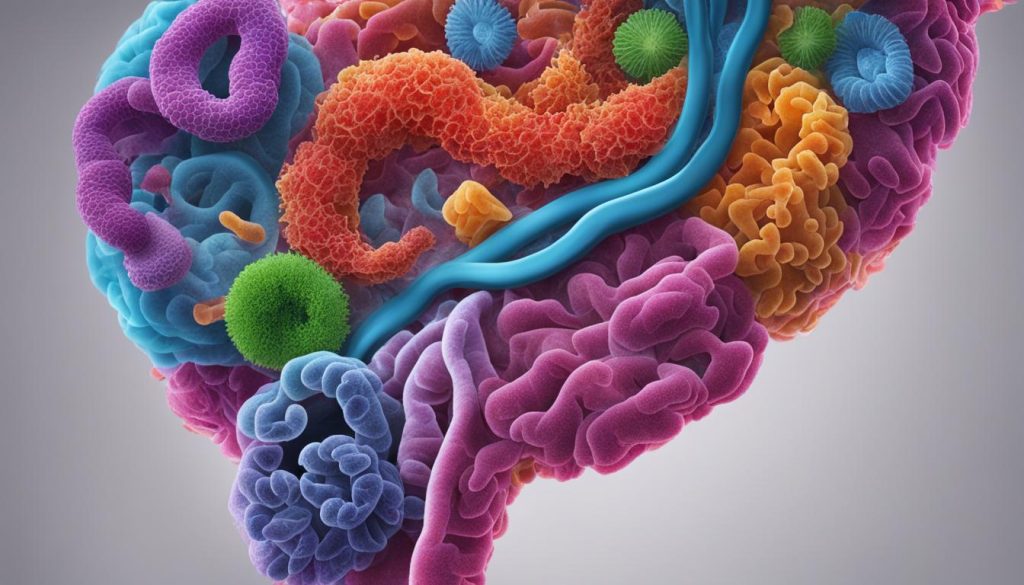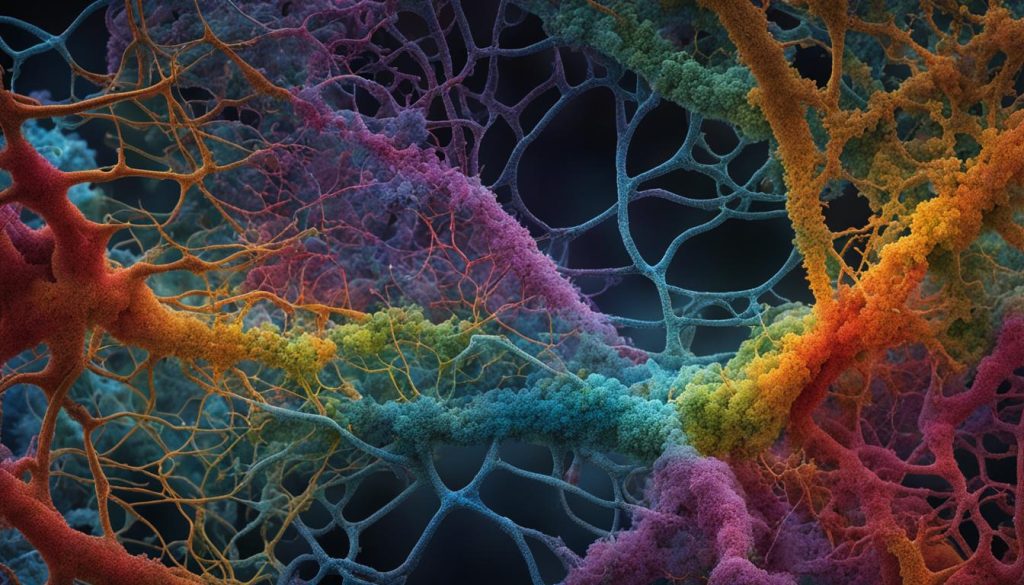As a journalist specializing in mental health, I have always been fascinated by the connection between our minds and bodies. Recently, I came across a groundbreaking area of research known as psychobiotics, and it has opened my eyes to a whole new understanding of how our gut health impacts our mental well-being.
The gut-brain axis, a bidirectional communication system between our gut and brain, is now recognized as a key player in maintaining our psychological well-being. And at the center of this axis lies the gut microbiota, the community of microorganisms living in our gastrointestinal tract. These tiny organisms, known as psychobiotics, have the potential to positively influence our mood, stress levels, and cognitive function.
Through intricate pathways such as neuroendocrine and neuroimmune pathways, psychobiotics interact with our nervous and immune systems, sending messages to our brain and affecting our mental state. By understanding this link between psychobiotics and mental health, scientists are discovering new strategies to improve our overall well-being.
Key Takeaways:
- Psychobiotics are live microorganisms that benefit our mental health.
- The gut microbiota plays a crucial role in the gut-brain axis.
- Psychobiotics can influence our mood, stress levels, and cognitive function.
- Understanding the link between psychobiotics and mental health can lead to new strategies for improving well-being.
- Research on the gut-brain axis and psychobiotics is still in progress.
The Role of Gut Microbiota in Mental Health
Research has shown that the gut microbiota plays a significant role in maintaining mental health. Imbalances in the gut microbiota have been associated with various mental health disorders, including anxiety and depression. The gut microbiota has the power to influence neurotransmitter production, resulting in changes in mood and behavior.
Moreover, the gut microbiota is involved in the stress response and can impact cognitive function. Understanding the crucial role of the gut microbiota in mental health is essential for developing effective interventions that can improve overall psychological well-being.
Studies have shown that the gut microbiota is directly linked to mental health, with imbalances in the gut microbial community contributing to the development of mental health disorders such as anxiety, depression, and stress. The gut microbiota can influence the production of neurotransmitters, which are chemical messengers that regulate mood and behavior.
Furthermore, the gut microbiota plays a role in the body’s response to stress. When exposed to stressful situations, the gut microbiota can influence the release of stress hormones, affecting an individual’s overall well-being. Additionally, the gut microbiota has been implicated in cognitive function, influencing processes such as memory and attention.
Understanding the role of the gut microbiota in mental health is crucial for developing targeted interventions that can improve psychological well-being. By focusing on maintaining a healthy gut microbial community, individuals may be able to reduce the risk of mental health disorders and improve cognitive function.
The Gut-Brain Axis and Probiotics
Probiotics, live microorganisms with potential health benefits, have been extensively studied for their impact on mental health. When ingested in adequate amounts, probiotics have the ability to influence the gut-brain axis, offering a promising avenue for improving mental well-being.
One of the ways that probiotics exert their effects on mental health is by modulating the composition and functionality of the gut microbiota. The gut microbiota, a diverse ecosystem of microorganisms residing in the digestive system, plays a crucial role in the gut-brain axis. By introducing probiotics to the system, they can positively influence the microbiome, leading to changes in neurotransmitter production and neuroimmune responses.
Research has shown that specific probiotic strains have the potential to alleviate symptoms of anxiety and depression, enhance stress resilience, and improve cognitive function. By targeting the gut-brain axis, probiotics can help regulate the delicate balance of neurotransmitters and immune responses, ultimately supporting psychological well-being.
To illustrate the crucial relationship between probiotics and the gut-brain axis, studies have demonstrated that certain probiotic strains promote the production of neurotransmitters such as serotonin, which is closely linked to mood regulation. Additionally, probiotics can modulate neuroimmune responses, reducing inflammation and promoting neuroprotection.
Incorporating probiotics as part of a holistic approach to mental health can yield significant outcomes. Probiotic supplementation or consumption of fermented foods enriched with probiotic strains offers a natural and accessible means of improving psychological well-being. However, it is important to note that the efficacy of probiotics can vary depending on the specific strain and dosage used.
The Gut-Brain Axis and Probiotics illustrate the potential for psychobiotics, live microorganisms with mental health benefits, to positively impact the gut-brain axis and improve psychological well-being. To visually understand the intricacies of this connection, refer to the following image:
Understanding and harnessing the power of the gut-brain axis offer promising avenues for developing interventions that support mental health. By incorporating probiotics into our daily routine, we can take proactive steps towards nurturing a healthy gut microbiota and promoting psychological well-being.
The Efficacy of Psychobiotics in Human Studies
Human studies have provided valuable insights into the efficacy of psychobiotics in improving mental health. These studies have yielded promising results, highlighting the positive effects of psychobiotics on symptoms related to anxiety, depression, and stress.
Through the modulation of brain activity, psychobiotics have been found to enhance cognitive performance and improve mood. Their impact on mental well-being has been observed through the use of probiotic supplements or fermented foods enriched with psychobiotic strains.

However, it is important to note that further research is necessary to determine the optimal dosages, treatment durations, and long-term effects of psychobiotics. Understanding these factors will allow for better integration of psychobiotics into mental health interventions.
Human studies serve as a critical foundation for exploring the potential of psychobiotics in improving mental well-being. By continuing to investigate their efficacy and addressing important research questions, we can unlock the full potential of psychobiotics in supporting mental health and overall well-being.
Mechanisms of Action: How Psychobiotics Affect Mental Health
The mechanisms by which psychobiotics impact mental health are still being explored but can partially be attributed to the gut-brain axis. Psychobiotics can modulate neurotransmitter production, such as serotonin and gamma-aminobutyric acid (GABA), which play crucial roles in mood regulation. They can also influence neuroimmune responses, reducing inflammation and promoting neuroprotection. Psychobiotics can also enhance the integrity of the gut barrier, preventing the translocation of harmful substances and reducing systemic inflammation. These mechanisms contribute to the overall improvement of mental health.
Preclinical and Clinical Evidence of Psychobiotics
Both preclinical and clinical studies have revealed compelling evidence supporting the effectiveness of psychobiotics in improving mental health. Preclinical studies, conducted in animals, have demonstrated that specific probiotic strains have the potential to alleviate symptoms of anxiety and depression, as well as enhance cognitive function. These findings offer valuable insights into the mechanisms through which psychobiotics exert their beneficial effects.
Moreover, clinical trials involving human participants have further confirmed the positive impact of psychobiotics on mental well-being. These studies have shown that psychobiotics can effectively mitigate symptoms of anxiety, depression, and stress, providing significant relief for individuals affected by these conditions. In addition, psychobiotics have been found to enhance cognitive performance, improving memory, attention, and overall cognitive function.
This growing body of evidence underscores the potential of psychobiotics as a safe and effective intervention for mental health disorders. By targeting the gut-brain axis, psychobiotics offer a promising avenue for enhancing psychological well-being and improving the overall quality of life for individuals struggling with mental health issues.
Gut Microbiota and Cognitive Function
The gut microbiota plays a crucial role in cognitive function, as demonstrated by both animal and human studies. Imbalances in the gut microbiota have been associated with cognitive impairments and neurodegenerative diseases such as Alzheimer’s disease. On the flip side, the administration of specific probiotic strains has shown promising effects on cognitive function, including improved memory and attention.

The gut microbiota’s influence on cognitive function is multifaceted. It can impact brain health by affecting neurotransmitter production, inflammatory responses, and the modulation of the gut-brain axis. Neurotransmitters play a crucial role in mood regulation, and the gut microbiota’s ability to produce these neurotransmitters can have a direct impact on cognitive well-being.
Psychobiotics, live microorganisms that promote mental health, offer a potential strategy for enhancing cognitive function. By targeting the gut microbiota with specific probiotic strains, psychobiotics can optimize the composition and functionality of the microbiome, leading to improved cognitive performance.
Overall, the connection between the gut microbiota and cognitive function highlights the importance of maintaining a healthy gut for optimal brain health. Incorporating probiotics and psychobiotics into our diets and lifestyle may have significant implications for promoting cognitive well-being.
Fermented Foods as Delivery Vehicles for Psychobiotics
Fermented foods, such as yogurt, sauerkraut, and kimchi, have long been embraced by various cultures for their unique flavors and health benefits. Recently, they have gained attention for their potential as delivery vehicles for psychobiotics, which are live microorganisms that promote mental health.
These fermented foods are naturally rich in probiotic strains, which can positively influence the gut microbiota and, in turn, impact mental well-being. By incorporating fermented foods into your diet, you can promote the growth and activity of beneficial microorganisms in your gut, enhancing its overall health.
The consumption of fermented foods enriched with psychobiotic strains can offer a sustainable and cost-effective means of delivering these beneficial microorganisms to your gut. By fostering a healthy gut microbiota, fermented foods can support improved psychological well-being.
Not only are fermented foods a delicious addition to your diet, but they also provide an enjoyable way to enhance your mental health. So, why not savor a serving of yogurt, indulge in sauerkraut with your meal, or embrace the tangy flavors of kimchi? Your gut and brain will thank you.
Future Directions and Challenges
The field of psychobiotics is still in its early stages, and there is much to learn about the specific mechanisms and optimal interventions for mental health. As researchers continue to explore the gut-brain axis and its influence on mental well-being, future directions should focus on several key areas.
Identifying Effective Psychobiotic Strains
One of the main challenges in the field of psychobiotics is identifying the most effective strains for improving mental health. While some studies show promising results with specific probiotic strains, further research is needed to determine which strains have the greatest impact on symptoms of anxiety, depression, and stress.
Determining Optimal Dosages and Treatment Durations
Another important area of focus is determining the optimal dosages and treatment durations for psychobiotics. Currently, there is limited information on the ideal amount of psychobiotics needed to produce therapeutic effects. Future studies should investigate different dosages and treatment durations to establish evidence-based guidelines.
Understanding Long-Term Effects
To ensure the safe and effective use of psychobiotics in clinical practice, it is crucial to understand their long-term effects. Longitudinal studies are needed to assess the sustained benefits and potential risks associated with prolonged psychobiotic use. This knowledge will help healthcare professionals make informed decisions about the duration and frequency of psychobiotic interventions.
Addressing Standardization and Personalized Approaches
Standardization is another challenge in the field of psychobiotics. Every individual’s gut microbiota is unique, and personalized approaches may be necessary to optimize the effectiveness of psychobiotics. Researchers should explore methods for tailoring psychobiotic interventions based on an individual’s specific gut microbiota composition.
Regulatory Considerations
As the popularity of psychobiotics grows, it is essential to address regulatory considerations. Guidelines and regulations are needed to ensure the quality, safety, and efficacy of psychobiotic products. Regulatory agencies should collaborate with researchers and industry experts to establish standards for psychobiotic formulations and labeling.
Despite the challenges, the future of psychobiotics in mental health research and treatment holds great promise. As the field continues to evolve, it is anticipated that advancements will be made in understanding the gut-brain axis, identifying effective interventions, and overcoming the obstacles that currently limit the widespread implementation of psychobiotics in clinical practice.
Implications for Mental Health and Well-being
The growing body of research on psychobiotics has significant implications for mental health and well-being. By targeting the gut microbiota through the use of psychobiotics, it may be possible to alleviate symptoms of anxiety, depression, and stress, as well as enhance cognitive function.
These interventions have the potential to provide personalized and non-invasive approaches to mental health care. By harnessing the power of the gut-brain axis, psychobiotics offer a novel and promising approach to promoting psychological well-being.
However, more research is needed to fully understand the optimal use of psychobiotics and their long-term effects on mental well-being. Unlocking the full potential of psychobiotics requires further exploration of their mechanisms of action and the development of standardized interventions.
Conclusion
The gut-brain axis is a fascinating and intricate system that connects our gut microbiota to our mental health. Through the study of psychobiotics, we have discovered that live microorganisms can have a profound impact on our psychological well-being. By modulating the composition and functionality of the gut microbiota, psychobiotics, often in the form of probiotics, have shown the ability to influence neurotransmitter production and alleviate symptoms of anxiety, depression, and stress.
Fermented foods have emerged as a natural and accessible way to deliver psychobiotics to our bodies. These foods, such as yogurt and sauerkraut, contain probiotic strains that can positively affect our gut microbiota and improve mental health. The field of psychobiotics holds tremendous promise for the future of mental health care, providing personalized and non-invasive interventions that can enhance our well-being.
However, while the research on psychobiotics is exciting, more studies are needed to fully understand their mechanisms of action and determine the optimal use of these interventions. We must continue to explore the intricate workings of the gut-brain axis and the role of psychobiotics in promoting psychological well-being. Through ongoing research and development, we can unlock the full potential of psychobiotics and revolutionize mental health care.
FAQ
What are psychobiotics?
Psychobiotics are live microorganisms, often probiotic strains, that provide a health benefit to mental health. They can influence mood, stress levels, and cognitive function.
How does the gut microbiota affect mental health?
Imbalances in the gut microbiota have been associated with mental health disorders, including anxiety and depression. The gut microbiota can influence neurotransmitter production, mood, behavior, stress response, and cognitive function.
What is the role of probiotics in the gut-brain axis?
Probiotics, when ingested in adequate amounts, can modulate the gut-brain axis and improve mental well-being. They can influence the composition and functionality of the gut microbiota, neurotransmitter production, and neuroimmune responses.
What evidence supports the efficacy of psychobiotics in human studies?
Human studies have shown the positive effects of psychobiotics on symptoms of anxiety, depression, stress, cognitive function, and mood. They have been found to modulate brain activity and enhance mental well-being.
How do psychobiotics affect mental health?
Psychobiotics can modulate neurotransmitter production, reduce inflammation, promote neuroprotection, and enhance gut barrier integrity. These mechanisms contribute to the improvement of mental health.
What does the evidence from preclinical and clinical studies suggest about psychobiotics?
Preclinical studies in animals and clinical trials in humans have shown that specific probiotic strains can reduce symptoms of anxiety, depression, and stress, improve cognitive function, and enhance mood.
What is the relationship between the gut microbiota and cognitive function?
Imbalances in the gut microbiota have been associated with cognitive impairments and neurodegenerative diseases. Conversely, specific probiotic strains have been shown to improve cognitive function, memory, and attention.
Can fermented foods deliver psychobiotics?
Yes, fermented foods such as yogurt, sauerkraut, and kimchi are rich in probiotic strains. They can modulate the gut microbiota and impact mental health, providing a natural and accessible means of delivering psychobiotics.
What are the future directions and challenges of psychobiotic research?
Future research should focus on identifying the optimal psychobiotic strains, determining dosages and treatment durations, and understanding long-term effects. Additionally, challenges such as standardization and personalized approaches need to be addressed.
What are the implications of psychobiotics for mental health and well-being?
Psychobiotics offer a promising approach to alleviate symptoms of anxiety, depression, stress, and enhance cognitive function. They provide personalized and non-invasive interventions for mental health care.
Is there a conclusion for psychobiotics and mental health?
Psychobiotics, by targeting the gut-brain axis, offer a novel and promising approach to promoting psychological well-being. Further research is needed to fully understand their optimal use and long-term effects.




